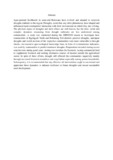The role of drought among agro-pastoral communities in a semi-arid environment: The case of Botswana
Abstract
Agro-pastoral livelihoods in semi-arid Botswana have evolved and adapted to recurrent droughts endemic to the region. Droughts, more than any other phenomena, have shaped and influenced rural communities' interaction with their environment on which they eke a living. The physical aspect of droughts and their effects are well known, but the often subtle and complex dynamics emanating from drought outbreaks are less understood among communities. A study was conducted during the 2009/2010 season to investigate how communities in Kgalagadi North and Bobonong Sub-districts perceive droughts, anticipate droughts and which sections of the respective communities were most vulnerable to drought shocks. An extensive agro-ecological knowledge base, in form of environmental indicators, was used by communities to predict imminent droughts. Preparations included storing excess crop harvests during good years, storing crop residues for livestock, buying commercial feed to supplement livestock and seeking alternative sources of income outside the agricultural sector. In spite of these efforts, drought still affected the communities negatively mainly through increased livestock mortalities and crop failure-especially among poorer households. Subsequently, it is recommended that any effective aid interventions ought to understand and appreciate these dynamics to enhance resilience to future droughts and ensure sustainable rural development.
URI
http://hdl.handle.net/123456789/306http://www.sciencedirect.com/science/article/pii/S0140196312003138
https://www.sciencedirect.com/science/article/abs/pii/S0140196312003138
http://erepository.uonbi.ac.ke/handle/11295/56150
https://www.researchgate.net/publication/256941568_The_role_of_drought_among_agro-pastoral_communities_in_a_semi-arid_environment_The_case_of_Botswana
http://agris.fao.org/agris-search/search.do?recordID=US201500007447
http://repository.seku.ac.ke/handle/123456789/342
https://doi.org/10.1016/j.jaridenv.2012.11.006
Collections
- Journal Articles (BE) [333]

